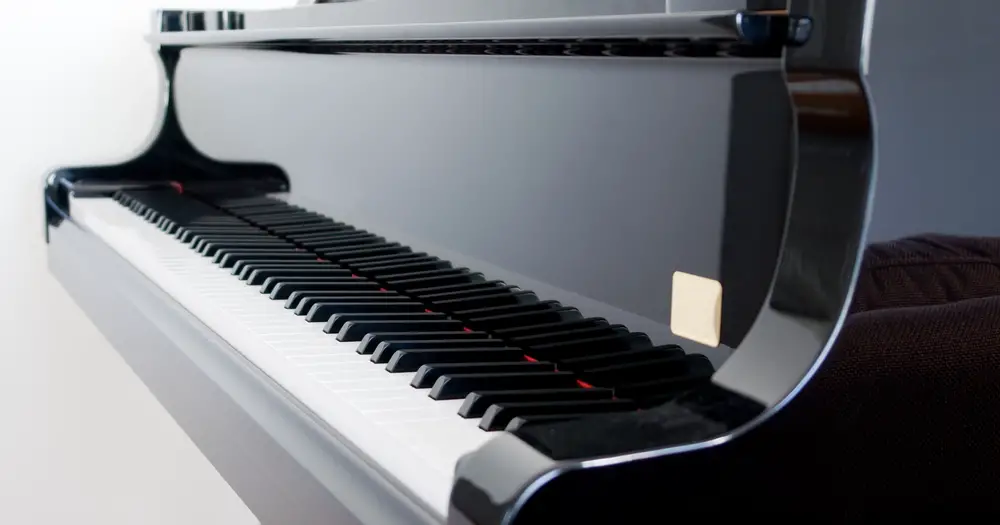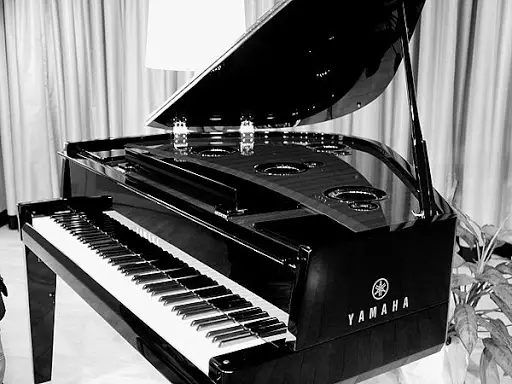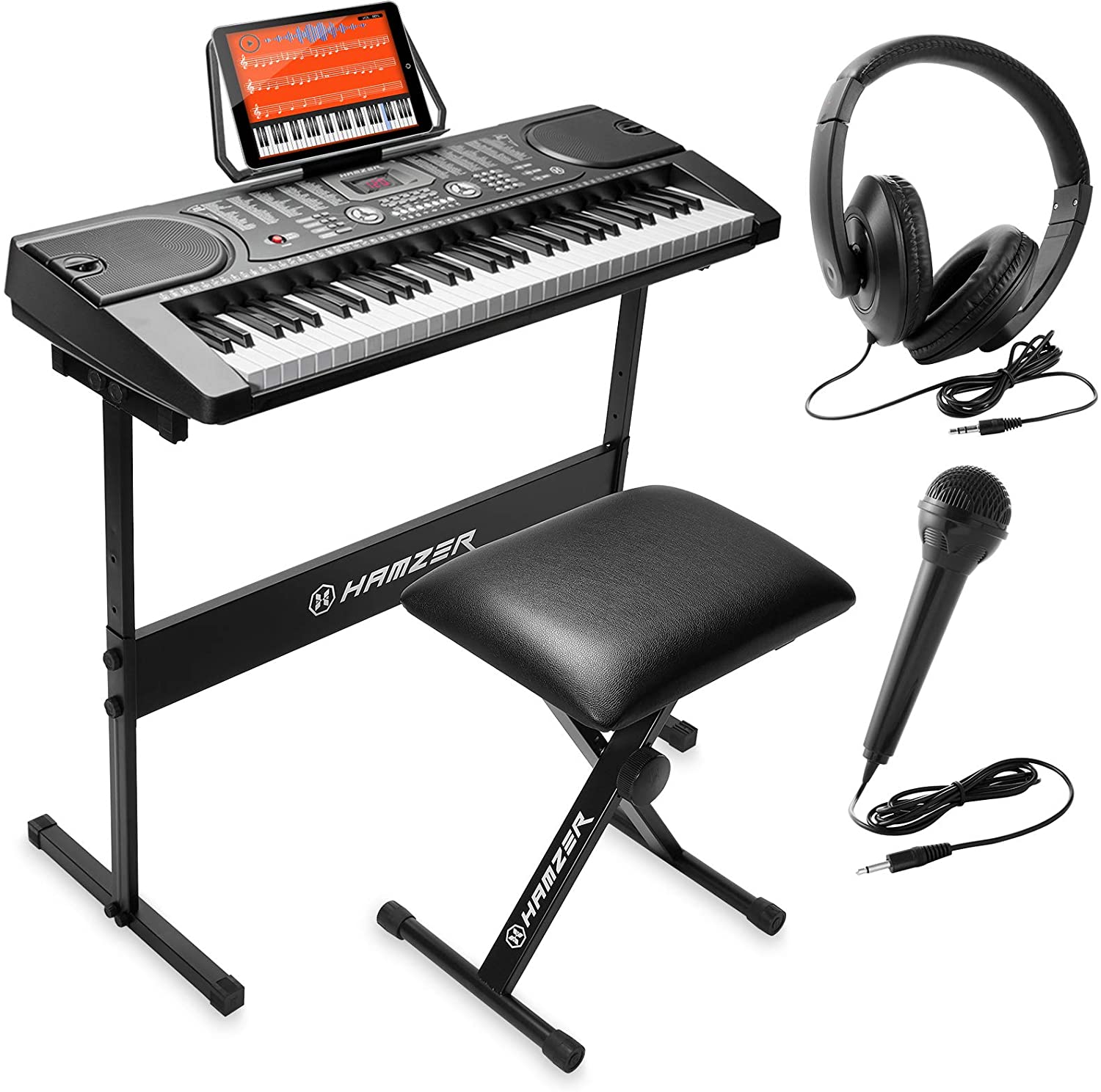
How different are pianos and keyboards?
Before buying either one, it’s crucial to know the differences.
Some people may be better off with a piano, while others can benefit more from a keyboard.
But how can you know which one is best for you?
In this article, I’ll explain everything you need to know about the differences between these two instruments.
Quick NavigationDifference Between a Piano and KeyboardPotential DifferencesCertain DifferencesCan You Play Piano on a Keyboard?What Circumstances Warrant Playing Piano on a Keyboard?Which One is Better For Beginners?Which One is Better For Your Scenario?Piano vs Keyboard- Which one should you learn?
Difference Between a Piano and Keyboard


There are lots of differences between the two. But, some of these differences are potential, while others are certain. Here are some of the main ones to look at:
Potential Differences
- Number of keys
- Weight of keys
- Key material
Certain Differences
- Number of sounds
- Action
- Overall weight
- MIDI connectivity
- Volume
One of the biggest differences between them is the number of keys. Plenty of digital keyboards have 88 keys, but many have less than that. Real pianos almost always have 88 keys. However, this lack of keys on keyboards doesn’t mean they’re a lower quality instrument. Some pianists prefer portability over everything. In general, the fewer keys there are, the lighter the keyboard is. Many pianists, especially artists and performers, don’t need the full spectrum of 88 keys to accomplish their goals.
On top of that, lots of digital pianos don’t have weighted keys. While some pianists buy non-weighted keyboards for budget reasons, others actually prefer these keys. This type of keyboard can better suit stage performers and at-home artists. Nevertheless, a large portion of digital pianos have fully weighted keys, just like real pianos.
Almost every keyboard on the market has a soundbank. Some soundbanks are small, and others are massive. Lots of times, the keyboards with smaller soundbanks have more accurate instrument sounds. But, that’s not always the case. Many top-of-the-line keyboards have huge soundbanks filled with world-class tones. This luxury usually doesn’t extend to real pianos. Most of the time, you get one sound, and it’s the piano. However, there are a few exceptions. “Player Grand Pianos” often let you change the sound. For example, you can layer a variety of pads with the actual piano sound.
The action of digital and acoustic pianos is slightly different. Keyboards usually have spring-loaded action. Springs at the back of the keys make sure they come back up. Grand pianos and upright pianos use hammer action. When you push down a key, a complicated process causes a wooden hammer to hit a string.
Instead of springs making the key come back up, it’s gravity. Because of the design, the hammers always fall back into the resting position. This type of action is slightly better for playing complex pieces. However, advancements with spring-loaded action have made it possible to play challenging pieces as well.
A more obvious difference between pianos and keyboards is the weight. Keyboards vary in weight, but they’re usually 10-80 pounds. Pianos, on the other hand, are usually no lighter than 300 to 400 pounds. Grand pianos can even be in the 500 to 600-pound range. So, you probably won’t be taking it anywhere. The lightweight nature of keyboards makes them portable and excellent for gigs. Gigging musicians usually look for keyboards in the 20 to 40-pound range.
In today’s music world, MIDI connectivity is essential in keyboards. Digital Audio Workstations like Ableton, Protools, Fl Studio, etc., open up a world of possibilities for keyboardists. MIDI connectivity is one advantage that keyboards have over grand pianos. You can connect to a computer to record, create songs, and experiment with different sounds. For ease-of-use, it’s recommended to buy an audio interface if you use a keyboard with software. However, many keyboards have USB MIDI jacks, which let you connect to a computer via a USB A-B cable.
One more difference between the two instruments is volume. Many keyboards come with internal speakers, but they usually don’t produce a powerful sound. Grand and upright pianos are complex mechanisms built to produce a big sound. That’s why performers can play grand pianos on stage without any microphones. The only downside to this immense sound is that you can’t turn it down.
Sometimes, you don’t always want a huge sound, especially if you live with others. An upside to owning a keyboard is that you can use headphones or plug into a speaker. Without a doubt, you can practice on a keyboard for a longer time in a house full of people. Even if your housemates don’t mind the sound, it could still be uncomfortable on your part.
Can You Play Piano on a Keyboard?

Getting straight to the point, yes, you completely can. Even though there are some differences between the two instruments, the functionality is basically the same. If you have a weighted-key keyboard, you can learn a song and most likely play it on a real piano with no problem. Many Casio and Yamaha keyboards have something called graded action. This type of action imitates the feel of a piano even more by making the lower keys slightly heavier than the rest.
Let’s say you buy a keyboard, get really good, and never practice on a real piano. In this case, the first time you play on a piano, all of your skills will transfer. The slight differences aren’t enough to create a significant instrument barrier.
What Circumstances Warrant Playing Piano on a Keyboard?
The two biggest factors that contribute to playing on a keyboard are cost and portability. Keyboards are much less expensive and a lot lighter. Not everyone has thousands of dollars to spend on a real piano. Another reason one might choose a keyboard is the array of different sounds and features. Keyboards, in terms of usability, are more versatile. You can experiment and record with different sounds as well as connect to computer software.
Which One is Better For Beginners?

Though both instruments can be excellent for beginners, keyboards have a slight edge over pianos. Why is this? One word: practice. Once again, if you live with others, practicing on a piano isn’t always an option. For example, you won’t be able to practice if others are asleep or want silence. It’s hard to beat the sound of a piano, but it’s very inconvenient if you can’t play when you want to.
With a keyboard, all you need is a pair of headphones. Beginners can practice as much as they please without disturbing others around them. If you haven’t played a piano or keyboard, you might not want to make a big investment yet. Keyboards are an affordable alternative to pianos. Beginners can also benefit from the entertainment value that the different sounds create.
Which One is Better For Your Scenario?
Everyone is different, so one option might be better for specific circumstances. Here are some factors that can determine which one is right for you:
- The sound you desire
- Available space in your house
- How much you value authentic vs digital
- Your purpose for playing
If the sheer quality of sound is your top priority, a real piano almost always wins. The highly sensitive hammers allow for much more dynamic possibilities. A real piano can also add a sleek visual appeal to any room. However, if your top priorities aren’t sheer sound quality and slick look, you might be better off with a keyboard. Even though keyboards can’t quite imitate a piano’s natural sound, they can still have fantastic tones and extensive soundbanks.
How much space you have in your house can also determine which one is best. Pianos require a little more space than keyboards. The amount of space depends on if it’s a grand or upright. An upright comprises about twice the space as a normal keyboard does due to the cabinet. If you have limited space, you might be better off with a keyboard.
Some people just really value authenticity. If you’re one of those people, a piano will be the best choice for you. Pianos have hundreds of parts that work together to create a natural acoustic sound. If the power goes out, you can still play the piano. Digital pianos have come close to replicating the sound, but they can’t replicate the authenticity.
Your purpose for playing is an important factor. If you’re looking to have fun and still build your skills, a keyboard is probably best. However, if you’re very serious about playing the piano and getting really good, you’ll likely benefit more from a piano. Of course, it will take a bigger investment because of the higher price.
It’s not impossible to reach an advanced level on a keyboard. In fact, you can do it just as easily as with a piano. A piano is a symbol that you’re determined to reach a high level and play the piano for the rest of your life.

